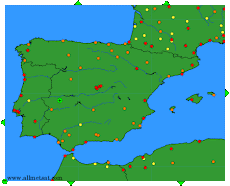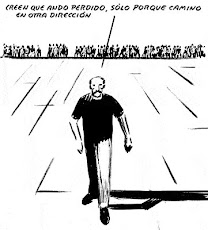viernes, 28 de marzo de 2014
NON À L’AÉROPORT DE NOTRE DAME DES LANDES
Up to 60,000 people took part in the “Non à l’aéroport de Notre Dame des Landes” huge march through the city of Nantes, held on february, 22nd, against the proposed airport at Notre Dames des Landes.
These are two videos from the demonstration. (Click here to watch video 1 or video2).
We also attach an article written by John Stewart, from European Aviation Campaigners, who attended the march.
On Saturday Nantes was ablaze. The anger at the proposed new airport outside this city in Western France boiled over: http://youtu.be/eIgNvAHIVmw. Up to 60,000 people took part in what was largely a peaceful demonstration: http://www.youtube.com/watch?v=EyZ9aDDqWfQ&list=PLYfjo3JyLy2TBtLWV_afrBLvUCVOzdOWa&feature=share The local campaign group ACIPA say that the tension rose when the police refused to allow the march to take the normal route through the city. When part of the march tried to do so it “faced violent police repression shot with rubber bullets, tear gas and stun grenades”: http://communiques-acipa.blogspot.co.uk/.
I have been to Nantes several times over last few years (although wasn’t there not on Saturday). The campaign has become a cause célèbre in France. It has “support committees” in over 200 towns and cities across France and Belgium. On a regular basis each committee lobbies and demonstrates in its own area. Over 60 coaches arrived in Nantes on Saturday with supporters from across the nation.
During the last Presidential elections four “peasant” farmers, whose land was threatened by the new airport, went on hunger strike for a month. They were visited by most of the presidential candidates. All, except for Hollande and Sarkozy, came out against the airport.
The profile of the campaign wasn’t always so high. I first met the campaigners in 2008 when five desperate farmers drove through the night to promote their case at a major Heathrow rally. They subsequently modelled much of their campaign on the successful fight against the 3rd runway. In particular, they built up the widest possible alliance of support.
The proposed new airport would be built around 15 miles from the city of Nantes in a landscape dotted with small farms and attractive villages. It is the classic French countryside, but without the British and their second homes!
The rationale for the new airport has never been entirely clear. Nantes already has a single runway airport which is under-used. The regional government argues that the new airport would regenerate the area. This is hotly contested by the campaigners who commissioned their own report which challenged the government’s economic case: http://www.cedelft.eu/publicatie/review_of_the_social_cost-benefit_analysis_of_grand_ouest_airport_%3Cbr%3E_comparison_with_improvements_of_nantes_atlantique/1191 They argue that the new airport has more to do with boosting the egos of the local politicians - including the former Mayor of Nantes Jean-Marc Aryault who was made Prime Minister under Hollande – than beefing up the economy.
It remains unclear how much support there may be from people in Nantes living under flight path to the current airport for the new airport. Certainly, it is not visible. In contrast, the opposition has mushroomed over the last six years. Local people have been joined by a range of political and environmental organizations as well as the direct action campaigners, many of whom live in tents and tree houses in a local wooded area known as the ZAD.
There have been tensions from time to time between the local community and the direct action activists in the ZAD but last winter the ZAD won huge respect from other parts of the coalition when, in freezing cold conditions, they defied attempts by authorities to remove them.
It is probably impossible at this stage to know what will happen next in Nantes. But I think it is part of an emerging pattern: it is becoming increasingly difficult to build major new projects anywhere in Western Europe. The Nantes campaigners have links with those opposing the HS2 high-speed link in Britain (http://stophs2.org/news/5792-les-grands-projets-inutiles-imposes) through what is known as the Campaign against Useless Imposed Mega-Projects. It is what is says on the tin! It includes the NO-TAV movement against high-speed rail in Northern Italy and Save Rosia Montana, the Romanian campaign against a vast cyanide-mined gold extraction project in Western Transylvanian. Last year the Nantes campaigners hosted the Useless Imposed Mega-Projects’ annual meeting.
Iain Martin wrote in the Daily Telegraph (14/1/09) about the Heathrow anti-third campaign: “the coalition assembled outside Parliament is extraordinarily wide. It runs from radical eco-warriors to middle-class mothers in west London, hedge fund managers in Richmond, to pensioners and parents in Brentford”. The links now being made by opponents of mega-projects are in some ways an extension of this. The anarchist on the streets of Nantes has little in common with the millionaire executive in the Chilterns…….except they are both passionately against a mega-project.
Certain conditions seem to need to be present for a mega-project to attract opposition from very disparate people.
• There is a real doubt whether the mega-project is essential for the economy. The economic case for the new Nantes Airport, HS2, the Rumanian gold-mine and the third runway at Heathrow are all hotly contested.
• The mega-project is site-based, i.e. there is land, homes, countryside or communities to defend.
• The mega-project is attracting significant local opposition. If the local opposition is non-existent or small, the essential first building block is missing.
• The mega-project must attract outside opposition. Nantes has become a magnet that has drawn a diverse range of protesters each there for a differ reason: environmentalist; anti-capitalist etc.
The new Nantes airport proposed for this unfashionable part of France has become the classic ‘useless’ mega-project. I suspect Heathrow Airport – and probably also the promoters of HS2 – will be looking closely at what happens next at Nantes.
John Stewart
EuropeanAviationCampaigners
martes, 25 de marzo de 2014
EL AEROPUERTO DE MADRID SE LLAMARÁ AEROPUERTO DE ADOLFO SUÁREZ MADRID-BARAJAS
Fiel a su estilo de hacer las cosas, sin contar con nada ni con nadie y cuando y como a él le viene en gana, el actual presidente del Gobierno de España ha decidido que el Aeropuerto de Madrid-Barajas pase a denominarse Aeropuerto Adolfo Suárez Madrid-Barajas.
Así lo comunicó la ministra de Fomento, Ana Pastor, que ayer anunció el cambio de nombre del aeródromo madrileño “en reconocimiento a la figura del expresidente y a su contribución a la democracia". La ministra indicó que ayer mismo firmó la Orden Ministerial para su remisión al BOE con el fin de cambiar el nombre del aeropuerto madrileño. La ministra además dedicó unas palabras para ensalzar la figura de Adolfo Suárez, quien "forma parte de la historia de todos los españoles al ser la contribución más decisiva, junto con el rey, a la sociedad de la libertad y el bienestar". También destacó la talla humana de Suárez, "la de la tolerancia y respeto al otro, del trabajo y de estar en política para mejorar la vida de la gente".
La alcaldesa de Madrid, manifestó que "No me parece mal; (el aeropuerto) es algo emblemático para Madrid y para España, y Adolfo Suárez, evidentemente, es una persona absolutamente especial en nuestra democracia. El aeropuerto de Barajas sería una manera también de rendirle un homenaje". Sin comentarios.
En otros países hay varios ejemplos de aeropuertos, como infraestructuras con la trascendencia y repercusión internacional que transmiten, dedicados a gobernantes que han marcado una época en su país, como el aeropuerto John Fitzgerald Kennedy en Nueva York, Charles de Gaulle en París, Indira Gandhi en Nueva Delhi, Ataturk en Estambul, Benito Juárez en México D. F., el David Ben Gurión de Tel-Aviv o el Yasir Arafat de Rafah. Todas ellas figuras históricas conocidas y reconocidas internacionalmente.
Aunque también hay algún ejemplo un tanto grotesco como el Aeropuerto George Bush de Houston, y que suponemos fue un homenaje del hijo al padre. Adjuntamos las noticias publicadas en los medios digitales más importantes: El Gobierno cambia el nombre de Barajas por el de Aeropuerto Adolfo Suárez, El aeropuerto de Madrid Barajas se denominará Adolfo Suárez, y la editorial publicada en Aviación Digital, con cuya valoración coincidimos: Madrid-Barajas ASG/Nueva York JFK/París CDG.
En cualquier caso, y en esto coincidimos con la editorial de Aviación Digital, estas cosas no deben hacerse así, y menos aún cuando se maneja la figura del que fuera el presidente del consenso, el artífice del cambio político en España a través de los grandes acuerdos, el que fuera capaz de juntar las firmas de franquistas y comunistas, nacionalistas y centralistas, conservadores y socialistas, sindicatos de clase y empresarios, etc., y todo ello en la España de finales de los años 70.
Desde Las mentiras de Barajas opinamos que honrar la memoria de Adolfo Suárez debe hacerse manteniendo la memoria no sólo de sus logros, sino de cómo alcanzó esos logros, y esto se ha obviado en este homenaje, que al final quedará como una cuestión personal del infame Rajoy, a la que se sumarán o no los demás. Además pedimos que se restablezca la seguridad operativa en el Aeropuerto de Adolfo Suárez Madrid-Barajas, para evitar que el nombre de Adolfo Suárez, quien trajo la democracia a España, quede ligado a un accidente de dimensiones catastróficas, por la insidia y desidia de los responsables de AENA, la AESA y la Dirección General de Aviación Civil del Ministerio de Fomento. No deseamos que este homenaje se convierta en un caramelo envenenado póstumo a una de las grandes personalidades españolas del siglo XX y de nuestra historia.
sábado, 8 de marzo de 2014
¿LES IMPORTA NUESTRA SALUD A LOS DIRIGENTES EUROPEOS?
Un estudio de la Unión Europea llamado ENNAH relaciona el ruido nocturno provocado por el tráfico aéreo con un incremento del riesgo de sufrir serios problemas cardiovasculares incluido el riesgo de infarto, en personas que han vivido mas de 20 años cerca de un aeropuerto. Este estudio es continuación del Proyecto HYENA (consultar los artículos LAS AUTORIDADES SANITARIAS ADVIERTEN: AENA MATA y AIRCRAFT NOISE AND CARDIOVASCULAR DISEASE NEAR HEATHROW AIRPORT IN LONDON: SMALL AREA STUDY)que concluyó que el ruido de aviones provocaba aumentos en la presión arterial, incluso cuando el afectado no se despertaba. El Proyecto ENNAH ha estudiado los efectos de 6 aeropuertos europeos en las poblaciones cercanas, sobre una muestra de 4816 adultos, de edad entre 45 y 70 años. Los efectos del ruido diurno no fueron tan evidentes como los del ruido nocturno.
Este año se celebran elecciones al Parlamento Europeo. ¿Estarán la seguridad aérea y el impacto que el tráfico aéreo, especialmente el nocturno, tiene sobre la salud de los europeos en la agenda de los líderes políticos?
Suscribirse a:
Entradas (Atom)





.png)













